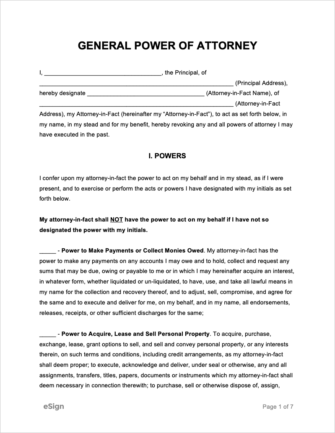

A general power of attorney form allows a person (agent) to make financial decisions for someone else (principal). It is a non-durable form that automatically terminates if the principal should become incapacitated. However, the form must be signed in the same method as a Durable Power of Attorney with two (2) witnesses, a notary public, or both.
A general power of attorney is a legal document allowing a person (“principal”) to select someone else to make any type of financial decisions on their behalf. It can grant the same powers to the agent as a durable power of attorney and is the same in every respect except that it is non-durable.
A general power of attorney is non-durable, meaning it will terminate immediately after a principal becomes incapacitated or can no longer think for themselves.
Granting power of attorney using a general POA form involves selecting someone to be your “agent,” completing the form, and signing in accordance with state law. In theory it is a simple process, but giving someone power of attorney means they will have the authority to make a number of important financial decisions, so the principal should be very mindful while completing each step.

The most important step is to choose an agent that will represent the principal’s financial interests. This type of power of attorney is common amongst business partners or anyone that would like representation for financial matters.

The principal can select any type of financial power including, but not limited to, those listed in the Uniform Power of Attorney Act (UPOAA):
In addition, the principal may include special powers to run a business, manage or sell property, and any other financial act permissible by state and federal law.

The principal and agent should complete the power of attorney together. If there is anything the principal doesn’t understand they should seek legal counsel.

A general power of attorney must be signed in the same manner as a durable power of attorney; the state signing requirements can be referenced when completing this step (notarization and two (2) witnesses is commonplace).
Prior to filling out the form, the principal should prepare by identifying someone they believe would make a great fit as their agent. They should then speak with their preferred agent to ask if they’d be willing to act in the role, are comfortable performing all of the actions required, and would sign the document when requested. If the agent is on board with acting as the attorney-in-fact, the principal can begin completing the document.
At the top of the first (1st) page, the principal will need to provide both their name and address, and the name and address of the agent they selected. The principal can include the ZIP code in parentheses next to the state if they feel it necessary.
The principal will need to inscribe their initials next to each power they wish to grant to the agent. If initials are not placed next to a power, the agent will NOT have the authority to perform these actions. If there are any miscellaneous powers the principal would like to grant to the agent, they can do so by providing their initials next to “Other” and entering the powers in detail on the three (3) lines provided.
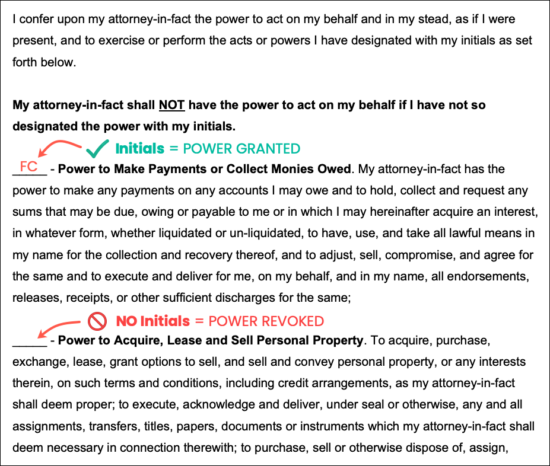
Provide the name of the state in which the principal resides on the single line provided. If the POA will be used primarily in another state, enter the name of the state in which the agent will be exercising their power.
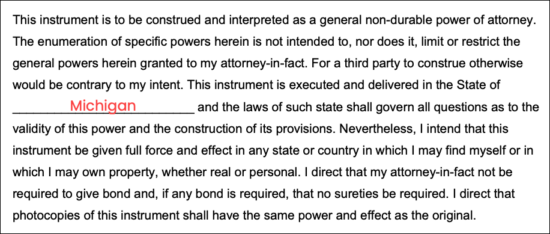
The effective date is the date on which the agent will be able to start performing their assigned duties for the principal. For the effective date, the principal can initial only one (1) of the two options provided.
If the principal wants the form to go into effect upon their incapacitation, a durable (financial) form should be used instead.
For the termination date, the pr incipal can select any/all of the three (3) following options:
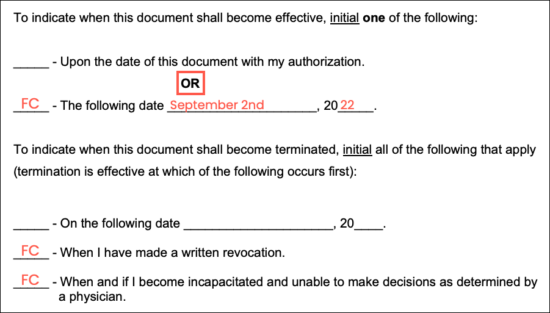
The principal will need to inscribe their signature onto the document in order for it to be legally binding. See the state signing requirements to ensure the form is signed properly. If the principal will be signing in the presence of a Notary Public or witnesses, they will need to wait to sign until these parties can observe the signature. At the time of signing, the principal will need to provide the following:
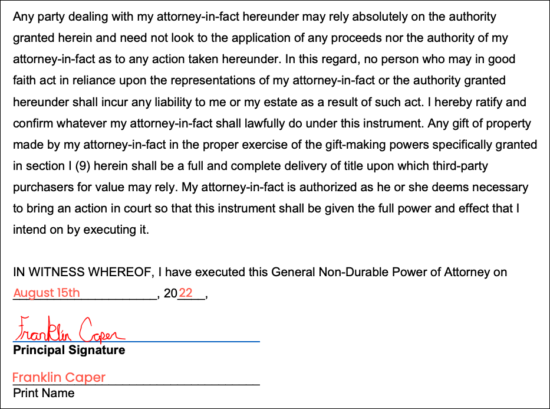
While not always a state requirement, the agent should sign the form to show they understand their role as the attorney-in-fact, and that they agree to uphold all responsibilities that come with this position. The agent will need to enter the following information:
The agent does not need to have their signature witnessed or notarized.
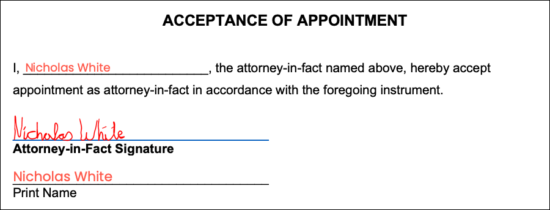
This section is to be completed by the witness(es) ONLY. Many states require the principal to have their signature witnessed by one (1) or more people. The witnesses should be over the age of eighteen (18+) and cannot be an agent of the principal. The notary cannot serve as a witness. Each witness will need to complete the following steps:
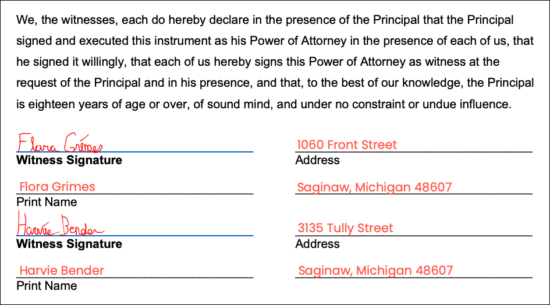
This section is to be completed by a Notary Public ONLY. No instruction is necessary.
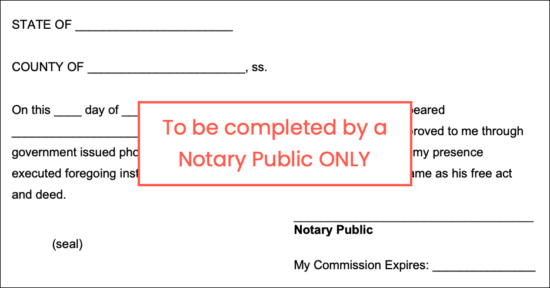
Durable ($) Power of Attorney – Can be used to grant the same powers as a general POA but remains effective in the event the principal becomes incapacitated.
Limited Power of Attorney – A customizable form used by a principal to nominate an agent to handle specific duties, often for a shorter period of time.
Tax Power of Attorney – A form that appoints an agent to handle tax matters for the principal. Most states have their own official document, whereas other states use the federally mandated IRS Form 2848.
Vehicle Power of Attorney – Used to grant an attorney-in-fact the power to perform tasks on behalf of the principal such as registering a vehicle, applying for a title, selling and buying vehicles, and recording liens.